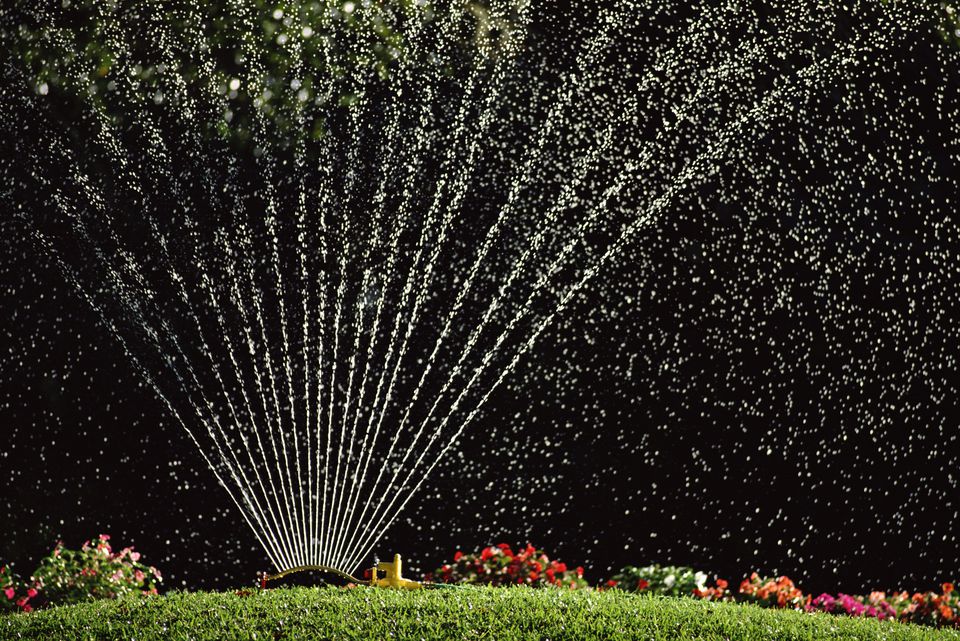The St. Johns River Water Management District’s watering restrictions are designed to ensure the efficient use of water for landscape irrigation. The restrictions allow enough water to maintain healthy landscapes year-round. The mandatory restrictions specify the time when watering may occur, the amount of water that may be applied, and the days when watering may occur for residential and nonresidential locations. These days depend on whether the address ends in an odd or even number, and on the time of year.
| Time of year | Homes with odd numbered or no addresses |
Homes with even numbered addresses | Nonresidential properties |
|---|---|---|---|
| Daylight saving time | Wednesday/Saturday | Thursday/Sunday | Tuesday/Friday |
| Eastern Standard Time | Saturday | Sunday | Tuesday |
|
|||
Irrigation terms
“Landscape irrigation” means the outside watering of plants in a landscape such as shrubbery, trees, lawns, grass, ground covers, plants, vines, gardens and other such flora that are situated in such diverse locations as residential areas, public, commercial and industrial establishments, and public medians and rights-of way. “Landscape irrigation” does not include agricultural crops, nursery plants, cemeteries, golf course greens, tees, fairways, primary roughs, and vegetation associated with intensive recreational areas, such as playgrounds, football, baseball and soccer fields.
“Residential landscape irrigation” means the irrigation of landscape associated with any housing unit having sanitary and kitchen facilities designed to accommodate one or more residents, including multiple housing units and mobile homes.
“Microirrigation” means the application of small quantities of water directly on or below the soil surface or plant root zone, usually as discrete drops, tiny streams, or miniature sprays through emitters placed along the water delivery pipes (laterals). Microirrigation encompasses a number of methods or concepts, including drip, subsurface, microbubbler and micro-spray irrigation, previously known as trickle irrigation, low volume or, low-flow irrigation.
“Nonresidential landscape irrigation” means the irrigation of landscape not included with the definition of “residential landscape irrigation,” such as that associated with public, commercial and industrial property, including commercial or transient housing units, hotel and motel units, and public medians and rights-of-way.
Summary of the restrictions
- Irrigation is prohibited between 10 a.m. and 4 p.m.
- During daylight saving time (second Sunday in March until the first Sunday in November) irrigation is limited to no more than two days per week on scheduled days.
- Residential irrigation is allowed on Wednesday and Saturday at addresses that end in an odd number or have no address.
- Residential irrigation is allowed on Thursday and Sunday at addresses that end in an even number.
- Nonresidential irrigation is allowed on Tuesday and Friday.
- During Eastern Standard Time (first Sunday in November until the second Sunday in March) irrigation is limited to no more than one day per week on scheduled days.
- Residential irrigation is allowed on Saturday at addresses that end in an odd number or have no address.
- Residential irrigation is allowed on Sunday at addresses that end in an even number.
- Nonresidential irrigation is allowed on Tuesday.
- Irrigation is limited to no more than ¾ inch of water per zone per irrigation day.
- Irrigation is limited to no more than one hour per irrigation zone per irrigation day.
- Irrigation is limited to only that amount necessary to meet landscape needs.
- When reclaimed water is available for irrigation use, the use of private irrigation wells is not authorized.
- Irrigation limitations apply to water withdrawn from ground or surface water, from a private well or pump, or from a public or private utility.
- Irrigation limitations apply to all landscape irrigation not currently regulated by a consumptive use permit. Typically, this includes residential, commercial and industrial establishments.
- Persons irrigating with an automatic lawn irrigation system installed after May 1991 shall install, maintain and operate a rain sensor device or switch that overrides the system when adequate rainfall has occurred.
Exceptions to the restrictions
- Irrigation using a micro-spray, micro-jet, drip or bubbler irrigation system is allowed anytime.
- Irrigation of new landscape is allowed at any time of day on any day for the initial 30 days and every other day for the next 30 days for a total of one 60-day period, provided that the irrigation is limited to the minimum amount necessary for establishment.
- Watering in of chemicals, including insecticides, pesticides, fertilizers, fungicides and herbicides when required by law, the manufacturer, or best management practices, is allowed anytime within 24 hours of application. Watering in of chemicals may not exceed ¼ inch of water per application except as otherwise required by law, the manufacturer, or best management practices.
- Irrigation systems may be operated anytime for maintenance and repair purposes, not to exceed 20 minutes per hour per zone.
- Irrigation using a hand-held hose equipped with a spray nozzle that can be adjusted so water flows only as needed is allowed anytime.
- Discharge of water from a water-to-air air-conditioning unit or other water-dependent cooling system is not limited.
- The use of water from a reclaimed water system is allowed anytime. A reclaimed water system includes systems in which the primary source is reclaimed water, which may or may not be supplemented from another source during peak demand periods.
- The use of recycled water from wet detention treatment ponds for irrigation is allowed anytime provided the ponds are not augmented from any ground or off-site surface water, or public supply sources.
County-specific exceptions
Orange County watering restrictions
All of Orange County is to follow the St. Johns restrictions. The only exception is Reedy Creek, which will follow the South Florida Water Management District’s restrictions.
Marion County watering restrictions
All of Marion County, including the city of Ocala, is to follow the St. Johns restrictions. The only exceptions are The Villages and the city of Dunnellon, which should follow restrictions of the Southwest Florida Water Management District.

